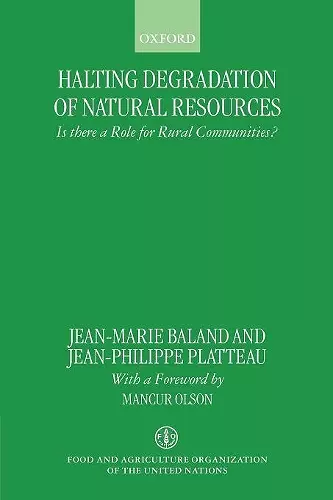Halting Degradation of Natural Resources
Is There a Role for Rural Communities?
Jean-Philippe Platteau author Jean-Marie Baland author
Format:Paperback
Publisher:Oxford University Press
Currently unavailable, and unfortunately no date known when it will be back

This wide-ranging book, based on a report to the Food and Agriculture Organization of the United Nations, bridges the gap between the enormous amount of empirical literature documenting efforts at managing local-level resources and the quickly growing body of theoretical knowledge dealing with natural resource management. By building a unifying framework, the authors aim to better define the conditions of success or failure of various forms of resource management at the village level. Contrary to a common view according to which mismanagement of such resources is to be ascribed to direct users falling prey to the Tragedy of the Commons', they convincingly argue that there are other important potential explanations, such as lack of awareness about ecological effects of human activities, poverty and heavy discounting of future income streams, uncertainty over future property rights and prices of natural products, and availability of more attractive income opportunities. Moreover, even when mismanagement practices obviously result from strategic interactions among users, many anthropological writings have pointed at crucial aspects that are bypassed by the characterization in terms of the classical Prisoner's Dilemma. Among these aspects, problems of leadership, co-ordination, and heterogeneity are given special emphasis in this book. The theoretical analysis specifies the various economic conditions (such as the extent of resource scarcity and market penetration, the size of user communities, and the nature of different parties' interests in the resource) and social considerations (such as the state of interpersonal communication, the frequency of interactions, the type of leadership, and the extent of mutual trust) under which these problems can possibly be overcome by local user groups. Stress is then laid on the global context within which user groups operate, including the nature and the forms of state intervention and the effects of increasing market integration. To date, this context has generally been uncongenial to community-based resource management; therefore, the authors recommend that, whenever a co-management approach is feasible, the concrete institutional form adopted is tailored to the specific features of local cultures.
We are in deep and grateful debt to Baland and Platteau for a work of clarity, analytical prudence, interdisciplinary consciousness, synthetic reach and insight, and expositional felicity. * Journal of Economic Literature *
ISBN: 9780198290612
Dimensions: 234mm x 156mm x 24mm
Weight: 626g
440 pages